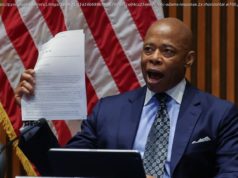Our republic has dealt with fake news, propaganda and a public square poisoned by polarization—and it’s still survived.
Now might not be the best time to bring up how well we are doing.
President Donald Trump and the Republicans are poised to pass a $1.5 trillion tax cut. They call it tax reform, but it’s not; the bill siphons off seas of wealth, sending it to the GOP’s elite and forcing the rest of us, over time, to finance it. As The New York Times ’ David Leonhardt wrote, the bill takes inequality, which is already bad, and turbocharges it, making it far worse. Public opinion is opaque and unlikely to get clearer.
All things considered, however, we are doing well, better than I feared in the miasmic days after the election. I don’t mean we don’t face immense challenges, and I don’t mean to trivialize injustice and trauma (or worse) resulting from this administration’s shameful policies and these Republicans’ cruel laws. But I do think it’s healthy to curb left-of-center voices of doom. Democracies can make terrible mistakes. The key is learning from them, and we seem to be doing that.
Keep up with this story and more by subscribing now
I won’t recite old news: polls showing Trump is the most unpopular president of the modern era; Democrats mobilizing for special elections, especially in Alabama’s Senate race; and the ongoing investigation into president’s clear (and clearer) ties to Russia, a possible crime that could bring down his presidency as well as the legitimacy of laws and policies that sprung from his White House.
Instead, let’s take my thesis—that the electorate is learning—and test it. Actually, I can’t test it, but the president can. I’m talking about growing speculation that he might fire special counsel Robert Mueller, the man investigating the president’s possible crimes.
Fox News, Breitbart News Network and at least one high-profile Republican senator have questioned and eroded Mueller’s credibility over the last week. When asked if he’d accept as legitimate Mueller’s findings, Texas Republican Sen. John Cornyn said on Twitter: “Makes sense to me to wait to see what they are first.” We expect authoritarian reaction from Breitbart, but a sitting senator? This inspired sober minds to say Trump will sack Mueller, and the Republicans will back him.
But it’s not clear Trump will or won’t fire him. (He said he won’t, but we should take that for what it’s worth.) He is indeed capable of the inconceivable; this president is a moral black hole. Sean Hannity would approve, I presume, and most of the president’s shrinking base would hoot and holler. But so far, there isn’t hard evidence suggesting he will or won’t beyond what the right-wing media echo chamber is doing. That a president is hollow enough to inflame constitutional crises is not, in and of itself, reason to panic.
What if he does? Is that reason to panic? Well, we should be stunned and horrified and all the emotions that go with witnessing the baldfaced corruption, impunity and sheer audacity of an American president holding himself above the law. But it doesn’t signal the end of the republic—yet.
I’m not so much worried about Trump doing something terrible—after all, he is who he is. I’m more panicked by the prospect of his firing Mueller, and the electorate shrugging with indifference. That would mean the America I know no longer exists. That would mean the America I love is more like Russia.
We are not like Russia, thank God. If Trump fired Mueller, he would spark not only a constitutional crisis but a blistering storm of press leaks. Republicans who dared stand idly by, or even defended Trump’s lawlessness, would face scorching public scrutiny, and a Democratic Party too happy to stab deeply at their self-inflicted wounds.
Special counsel Robert Mueller leaves a closed meeting at the Capitol in Washington, DC. on June 21. Getty
Those leaks, moreover, would harden what two-thirds of the electorate already believe: that Trump did something prior to the election that was at the very least unethical. If, after firing Mueller, it were proven beyond a doubt Trump did nothing wrong, I’m not sure it would matter. Firing Mueller would be proof enough for most.
Recall how much the Republicans squirmed after Trump sacked James Comey, the former FBI director. Between his firing and Mueller’s appointment, they were buffeted daily with leaks, including from Comey himself. Those leaks threatened to derail everything they hoped to achieve. After Mueller rose to the task, the leaks slowed to a trickle. You’d think the Republicans would hold Deputy Attorney General Rod Rosenstein in honor for appointing him. Only after the leaks stopped was Congress able to move on to tax cuts.
We read about fake news, propaganda and a public square poisoned by polarization. But the republic has always dealt with these, one way or another. Some political scientists believe polarization is the norm, historically speaking. The majoritarian impulse defining the decades after World War II was anomalous. If we were like Russia, no one would know if anything were true, and few would have faith in self-government. If America were heading toward fascism, polls would find more people in favor of the president than opposed.
The founding generation knew democracies were vulnerable to fits of passion and error. The 2016 election and Trump’s presidency are a case in point. But as long as the electorate learns from its mistakes, democracies can find their way back to good health. I could be wrong, of course, but if Trump fires Mueller, we’ll find out.
John Stoehr is a fellow at the Yale Journalism Initiative, a contributing writer for the Washington Monthly, an essayist for the New Haven Register and a U. S. News & World Report contributing editor.






